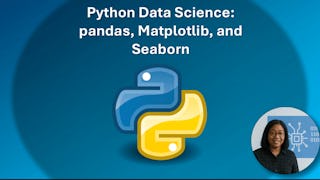- Browse
- Human Computer Interaction
Human Computer Interaction Courses
Human Computer Interaction courses can help you learn user interface design, usability testing, interaction design principles, and accessibility standards. You can build skills in user research, prototyping, and evaluating user experiences across various platforms. Many courses introduce tools like Figma, Sketch, and Adobe XD, that support creating and testing interfaces, along with methods for gathering user feedback and iterating on designs.
Popular Human Computer Interaction Courses and Certifications
 Status: NewNewStatus: PreviewPreview
Status: NewNewStatus: PreviewPreviewSkills you'll gain: Responsible AI, AI Workflows, AI Orchestration, Agentic systems, Generative AI Agents, Artificial Intelligence, Coordination, AI Security, Data Ethics, Governance, Systems Architecture, Software Architecture, Scalability, Regulatory Compliance, Communication Strategies, Communication
Intermediate · Course · 1 - 4 Weeks
 Status: PreviewPreviewY
Status: PreviewPreviewYYale University
Skills you'll gain: Cardiology, Anatomy, Obstetrics And Gynecology, Urology, Neurology, Pulmonology, Nephrology, General Surgery, Diagnostic Radiology, Medical Terminology, Surgery
4.8·Rating, 4.8 out of 5 stars1.9K reviewsIntermediate · Course · 1 - 3 Months
 Status: NewNewStatus: PreviewPreviewJ
Status: NewNewStatus: PreviewPreviewJJohns Hopkins University
Skills you'll gain: User Centered Design, Health Promotion, Health Information Management, digital literacy, Health Policy
Beginner · Course · 1 - 3 Months
 Status: Free TrialFree TrialU
Status: Free TrialFree TrialUUniversity of Toronto
Skills you'll gain: Apple iOS, Swift Programming, iOS Development, Model View Controller, Apple Xcode, Mobile Development, User Interface (UI), Application Design, Application Development, Objective-C (Programming Language), UI Components, Animations, User Interface and User Experience (UI/UX) Design, Object Oriented Programming (OOP), Application Frameworks, Interaction Design, Programming Principles, Data Persistence, Integrated Development Environments, Persistence
3.9·Rating, 3.9 out of 5 stars1.6K reviewsIntermediate · Specialization · 3 - 6 Months
 Status: NewNewStatus: PreviewPreviewU
Status: NewNewStatus: PreviewPreviewUUniversidad de Palermo
Skills you'll gain: Value Propositions, Price Negotiation, Consumer Behaviour, Communication Strategies
Beginner · Course · 1 - 4 Weeks
 Status: NewNewL
Status: NewNewLLogical Operations
Skills you'll gain: Seaborn, Matplotlib, Data Transformation, Plot (Graphics), Pandas (Python Package), Data Manipulation, Data Visualization Software, NumPy, Data Visualization, Data Analysis, Scatter Plots, Data Science, Jupyter, Graphing, Data Processing, Box Plots, Python Programming, Computer Programming, Computer Programming Tools, Software Development
Mixed · Course · 1 - 4 Weeks
 Status: Free TrialFree TrialU
Status: Free TrialFree TrialUUniversity of California San Diego
Skills you'll gain: Unit Testing, Data Structures, Java, JUnit, Performance Tuning, Debugging, Algorithms, Object Oriented Programming (OOP), Theoretical Computer Science, Unstructured Data
4.8·Rating, 4.8 out of 5 stars2.2K reviewsIntermediate · Course · 1 - 3 Months
 Status: NewNew
Status: NewNewSkills you'll gain: 3D Assets, 3D Modeling, Visualization (Computer Graphics), Computer Graphics, Animations, Simulations
Beginner · Course · 3 - 6 Months
 Status: NewNewL
Status: NewNewLLogical Operations
Skills you'll gain: Seaborn, NumPy, Matplotlib, Data Transformation, Data Manipulation, Data Visualization Software, Pandas (Python Package), Plot (Graphics), Data Visualization, Jupyter, Scatter Plots, Data Science, Data Processing, Data Analysis, Box Plots, Python Programming, Graphing, Computer Programming, Computer Programming Tools, Software Development
Intermediate · Specialization · 1 - 3 Months
 Status: FreeFreeU
Status: FreeFreeUUniversity of Pittsburgh
Skills you'll gain: Laboratory Testing, Diagnostic Tests, Medical Terminology, Vital Signs, Clinical Practices, Clinical Experience, Patient Communication, Hospital Medicine, Patient Safety, Medication Administration, Intravenous Therapy, Anatomy, English Language
4.8·Rating, 4.8 out of 5 stars3.2K reviewsBeginner · Course · 1 - 3 Months
 Status: NewNewStatus: Free TrialFree Trial
Status: NewNewStatus: Free TrialFree TrialSkills you'll gain: Performance Tuning, Java, Enterprise Application Management, Computational Thinking, Algorithms, Data Structures, Scalability, Programming Principles, Debugging, Management Consulting, Mitigation, Project Implementation
Advanced · Course · 1 - 4 Weeks
 Status: NewNewStatus: Free TrialFree TrialR
Status: NewNewStatus: Free TrialFree TrialRReal Madrid Graduate School Universidad Europea
Skills you'll gain: Data Presentation, Matplotlib, Data Synthesis, Probability Distribution, Data Processing, Data Integration, Data Literacy, Performance Analysis, Exploratory Data Analysis, Statistical Analysis, Probability, Applied Machine Learning, Analysis, Image Analysis, Descriptive Analytics, AI Enablement, Business Analytics, Statistical Methods, Data Collection, Machine Learning
Beginner · Specialization · 3 - 6 Months
In summary, here are 10 of our most popular human computer interaction courses
- AI Agents: Multi-Agent Design & Governance: Coursera
- Anatomy of the Chest, Neck, Abdomen, and Pelvis: Yale University
- Digitizing Population Health in Low-Resource Settings: Johns Hopkins University
- iOS App Development with Swift: University of Toronto
- Marketing y diseño de experiencias: Universidad de Palermo
- Python Data Science: pandas, Matplotlib, and Seaborn: Logical Operations
- Data Structures and Performance: University of California San Diego
- Blender Beginner's Bootcamp: Packt
- Using Data Science Tools in Python: Logical Operations
- Clinical Terminology for International and U.S. Students: University of Pittsburgh










